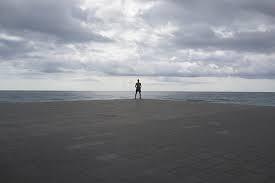Given that speech is one of, if not the primary distinguishing feature separating we human beings from animals, isn't the thought of losing the capacity for speech, (which is terrible enough), made even more terrible by this thought: Would we be more like beasts if somehow we lost our powers of speech? I've had that thought a lot lately. I have a hemorrhagic nodule on my right vocal cord and I must remain silent for the better part of six weeks.
What happens in volitional silence though, is that the spaces we create by eliminating our own excessive words becomes something both challenging and openly rewarding. Of the rewards of silence, the greatest are the spaces it creates. Spaces that are, if not actually created, then perceived. That is to say that when one is speaking -- and perhaps more accurately -- when one is prattling on as I'm want to do, there can be no discernable spaces at all.
And what of them, these spaces? Well, for those interested in obtaining faith, that wispiest of sensations, I would suggest it's best sowed in silence and in particular, within those spaces that silence suggests. Just the other day, I noticed a very moving, albeit very small thing, that if I weren't engaging in my current fast of words I might have missed altogether. What I saw involved a kid of seven, named Jeremy.
I was sitting in Synagogue on the holiday of Simchat Torah, when Jeremy came running up to his grandfather with a look of pent up distress. Jeremy could barely contain himself, and through tears blurted out: "Somebody kicked me in the eye three times." I glanced up from my prayer book and saw immediately that the injury wasn't serious enough to warrant medical attention, (in fact, I saw no injury at all), but what happened next is the relevant part. Jeremy, with one eye closed, crawled like a tiny pirate, into his grandfather's lap, curled up and quietly wept as his grandfather stroked his head. This sweet vignette lasted for about three minutes, and in that space, I was lucky to see a beautiful, soulful thing.
Soon some kids (possibly even the one who'd kicked Jeremy three times in the eye) started up another raucous game of kick the whatever-it-was. Jeremy, hearing the excitement, wriggled down from his grandfather's lap and commenced to play -- as if his eye had not even been kicked once.
The humanness, the sweetness, the very life-blood of this scene is now a part of me and I'm deeply grateful for that. The little memory isn't much in the scheme of things to be sure. It's not a new car, it's not a promotion, it's not an award proffered or a prize won. It is however, because of its sheer granularity, a dose of powerful medicine, an antidote to the endless, yawning negativity that I (and I assume we all) can scarcely avoid soaking up like a hotel bath towel.
If I were able to speak at that Synagogue service, I would most probably have been speaking. Looking about and commenting as I always do, hearing the general din and feeding back my all-important thoughts, feeling the frantic sensations and giving a full report - all in an unceasing cycle of words that allow no time for spaces. Spaces where one can observe a seven year old doing what they do best -- which is to display, in the most fearless way, human frailty and vulnerability. In this case, in the strong arms of a loving grandparent.
Where there is too much speaking there are no spaces. Where there are no spaces, there is no way to be moved. No chance of being shaken to the core with a sense that love is still possible -- in spite of it all. And this too, I learned from going silent.
